Facing a consumer issue in South Dakota? The South Dakota Division of Consumer Protection can help. This article explains your rights, key South Dakota consumer protection laws, and steps to file a complaint. Empower yourself with the knowledge to tackle unfair business practices.
Key Takeaways
- Consumer protection in South Dakota is enforced by the South Dakota Division of Consumer Protection, which addresses complaints, mediates disputes, and educates the public about their rights.
- Key consumer protection laws include the Federal Trade Commission Act, the Fair Packaging and Labeling Act, and the state’s Deceptive Trade Practices and Consumer Protection law that empower consumers against unfair practices.
- Consumers can file complaints through various methods, including phone, email, and online forms, and should support their claims with thorough documentation for effective resolution.
Understanding Consumer Protection in South Dakota
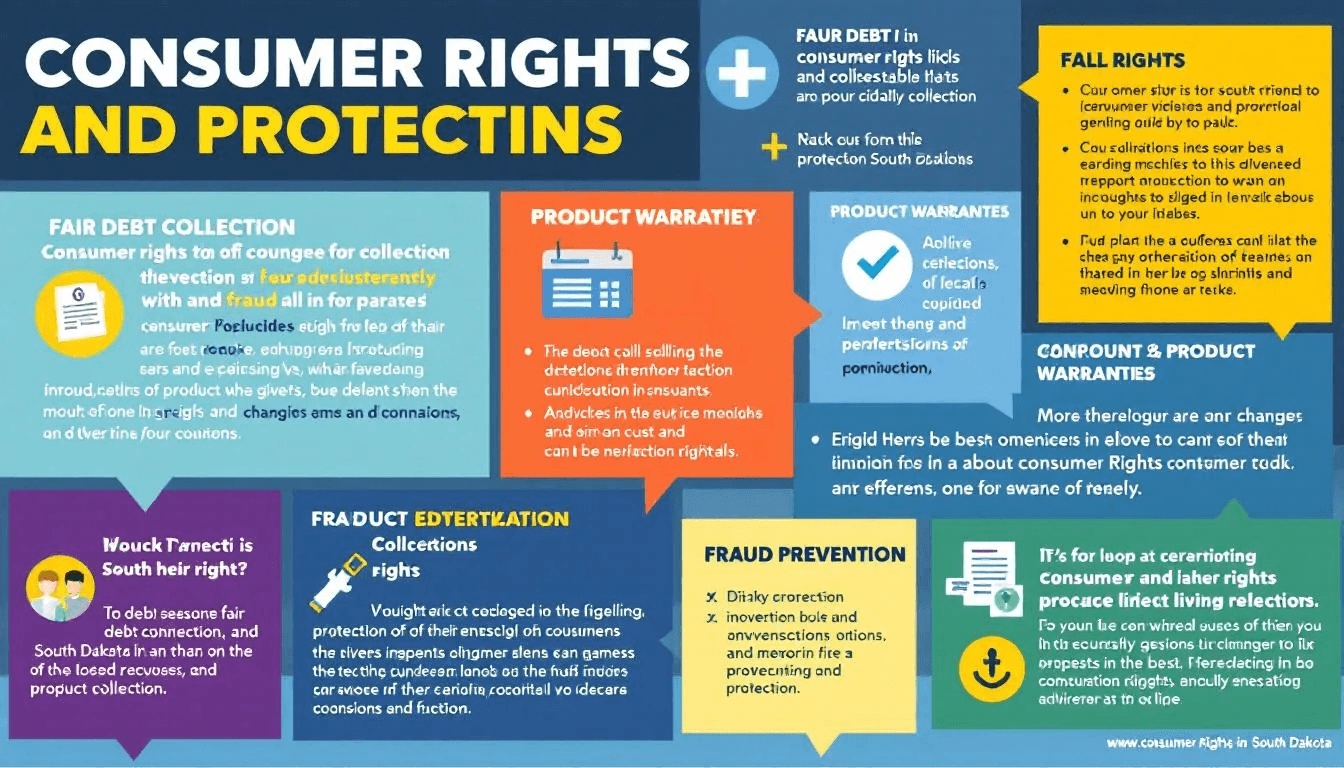

Consumer protection in South Dakota covers a broad spectrum of regulations aimed at ensuring fair treatment for consumers and shielding them from fraudulent or unfair business practices. These laws are the backbone of a system designed to protect consumers’ rights in various aspects, from general trade practices to specific industries like banking and insurance. The South Dakota Division of Consumer Protection plays a pivotal role in this ecosystem, enforcing these laws, handling complaints, and educating the public about their rights.
Knowing where to turn when your rights are violated can be empowering. The South Dakota Division of Consumer Protection, headquartered in Pierre, SD, is your go-to agency for addressing consumer issues.
They provide a wealth of resources, including hotlines and online platforms, to assist residents in resolving disputes and understanding their rights. Staying informed and using these resources empowers consumers to guard against unfair practices.
Key Consumer Protection Laws
Several key consumer protection laws form the foundation of consumer rights in South Dakota. The Federal Trade Commission Act (FTCA) is a major pillar, setting standards to prevent misleading statements by businesses. Another critical law is the Fair Packaging and Labeling Act, which mandates that product packaging must provide accurate and truthful information, ensuring that consumers are not deceived by false claims.
South Dakota’s own laws further enhance these protections. The Deceptive Trade Practices and Consumer Protection law specifically targets misleading business practices, providing a legal framework for consumers to seek redress. Additionally, the state has laws regulating telemarketing practices to safeguard consumers from unsolicited and potentially fraudulent calls. These laws allow consumers to file complaints and initiate legal action if they believe their rights have been violated.
Another notable regulation is the National Do Not Call Registry, which allows consumers to opt out of receiving telemarketing calls. South Dakota also provides specific protections for door-to-door sales, giving consumers a three-day period to cancel such transactions without penalty. These comprehensive laws collectively aim to protect consumers from various forms of deception and unfair practices that are prohibited.
Role of the South Dakota Division of Consumer Protection
The South Dakota Division of Consumer Protection is instrumental in enforcing consumer laws and investigating deceptive trade practices. This division not only handles consumer complaints but also mediates between consumers and businesses to resolve disputes. When a consumer files a complaint, the division conducts an inquiry and may refer the issue to other agencies if they are better suited to handle it.
Before escalating to the Division, consumers are encouraged to attempt resolving issues directly with the business involved. If the problem remains unresolved, the Division steps in, leveraging its authority to ensure compliance with consumer protection laws and uphold consumer rights. This dual approach helps maintain fair business practices across the state.
Filing Consumer Complaints in South Dakota
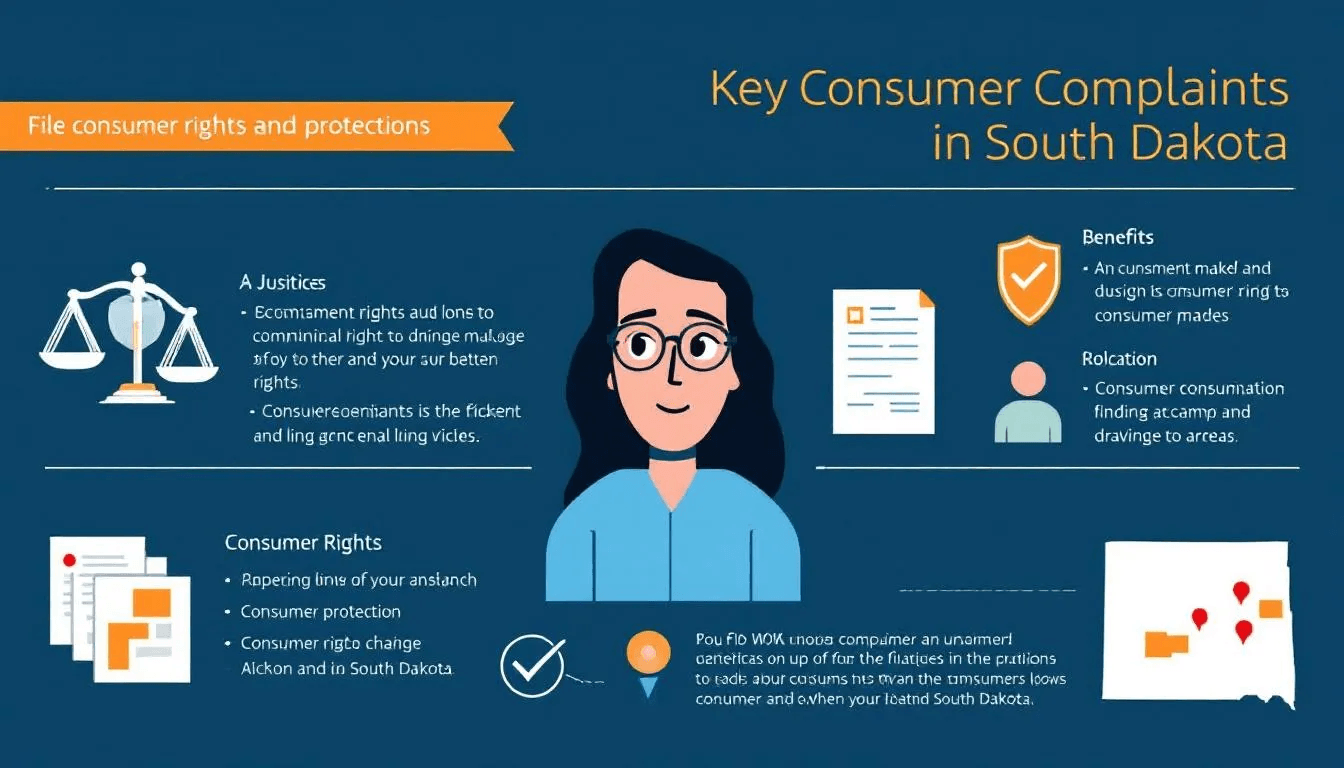

When facing unfair business practices, the first step for consumers in South Dakota is to address the issue directly with the business. If this does not yield a satisfactory resolution, the next step is to file a complaint with the South Dakota Division of Consumer Protection.
This division is dedicated to addressing consumer complaints and ensuring that businesses adhere to state laws.
Contacting the Division of Consumer Protection
Consumers can file a complaint by contacting the South Dakota Division of Consumer Protection via:
- Phone at 1-800-300-1986 (In-State) or (605) 773-4400
- Email at consumerhelp@state.sd.us
- Fax at (605) 773-7163
- Mail at 1302 E Hwy 14, Suite 3, Pierre, SD 57501.
For those who prefer online methods, the Division provides an online complaint form on their website. When contacting the Division, it’s crucial to provide your full name, address, and phone number to ensure your inquiry is handled effectively.
Required Documentation
Supporting your complaint with thorough documentation is vital for a successful resolution. Essential documents include:
- Receipts
- Contracts
- Advertisements
- Cancelled checks
- Bills
- Any related correspondence
These documents help illustrate the nature of the complaint and provide evidence of the transaction or interaction, including copies of relevant goods, while dealing with the necessary documentation to find the required information page line that occurred in order, as received and presented, set type.
Keeping detailed records of all interactions with the business, including names, dates, and conversation details, can significantly strengthen your case. This documentation should demonstrate the attempts made to resolve the issue directly with the company and highlight any discrepancies or unauthorized charges.
Follow-Up Process
Once a complaint is filed:
- An investigator from the Division reviews it and contacts the business involved, which has 20 days to respond.
- During this period, the Division may reach out to the complainant for additional information to support the investigation.
- Throughout the process, consumers are kept informed about the progress of their complaint.
If the complaint remains unresolved, it may be referred to another agency better equipped to handle the issue. This ensures that every complaint is addressed thoroughly and fairly.
Financial Services and Banking Complaints
Financial services and banking complaints are another critical area of consumer protection. Issues with financial institutions can be complex, but South Dakota has specific authorities to address these concerns.
The South Dakota Division of Banking regulates state-chartered banks and some other financial institutions, ensuring they comply with state laws and address consumer complaints.
Contact Information for Banking Authorities
For assistance with banking-related issues, consumers can contact the South Dakota Division of Banking at 1714 Lincoln Ave., Suite 2, Pierre, SD, or by calling 605-773-3421.
This division is responsible for addressing inquiries and concerns related to banking and consumer credit.
Common Banking Issues
Common banking complaints often involve:
- Unauthorized fees
- Loan disputes
- Discrepancies in banking statements
- Unauthorized charges
- Problems with the services provided by financial institutions
Addressing these complaints usually begins with contacting the financial institution directly, but if issues remain unresolved, they can be escalated to consumer protection agencies after the consumer has contacted them.
These complaints are significant concerns for consumers, and the South Dakota Division of Banking plays a crucial role in mediating and resolving these issues. By understanding the common problems and knowing where to seek help, consumers can better protect their financial interests.
Insurance and Securities Protections
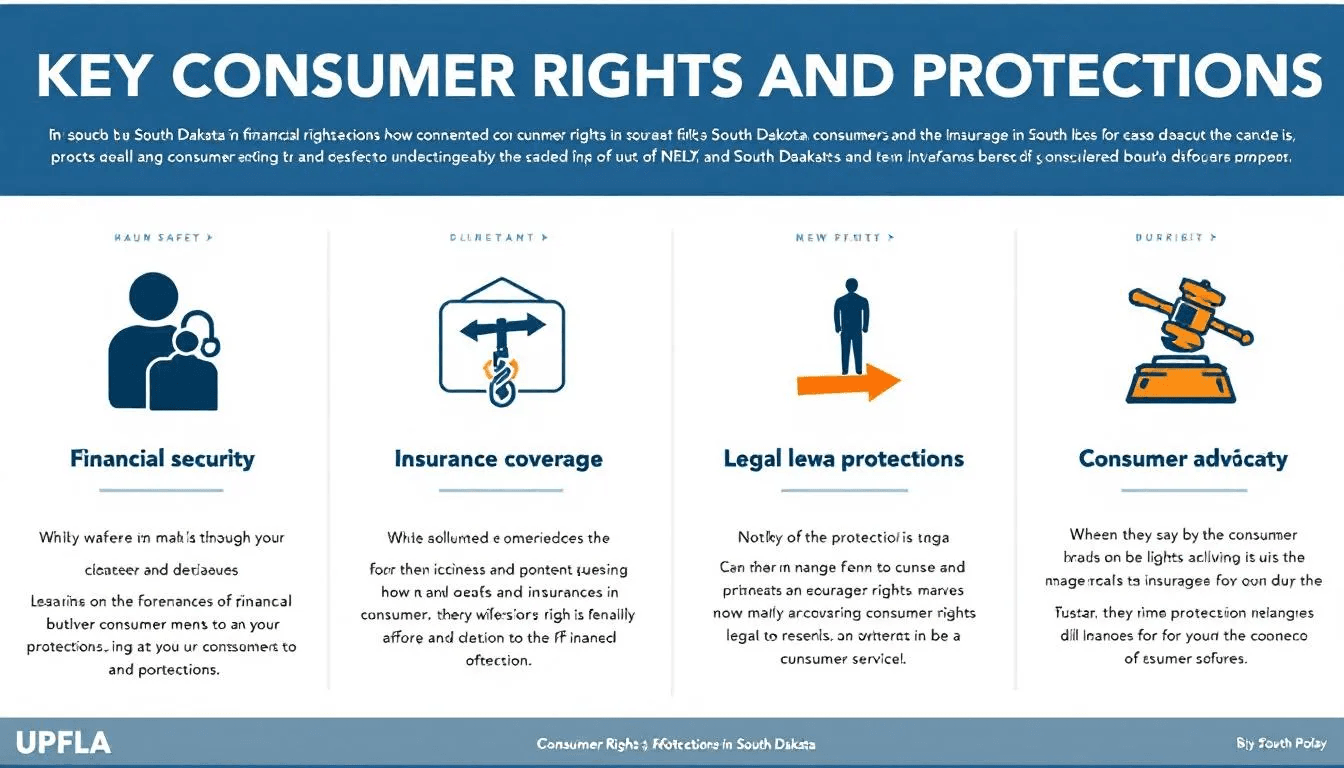

Insurance and securities protections are vital for ensuring that consumers make informed decisions and are safeguarded against fraud. In South Dakota, insurance regulators oversee compliance and provide resources to help consumers choose the right insurance products.
Similarly, state securities regulations protect investors by ensuring full disclosure and preventing fraudulent activities.
Contacting Insurance Regulators
Consumers can reach the South Dakota Division of Insurance for inquiries or complaints at 605.773.3563.
Complaints can also be filed online through the Division’s platform, ensuring that consumers have multiple avenues to seek assistance.
Securities Regulation and Investor Protection
State securities laws and regulations are enforced to protect investors in South Dakota. These regulations cover a range of investment products, including stocks, mutual funds, commodities, and real estate. These laws provide oversight and ensure full disclosure, helping consumers make informed investment decisions and protecting them against potential fraud. The states’ regulations help to further safeguard these investments.
The state securities agencies offer educational resources and guidance to help investors understand their options and make safe investment choices. This proactive approach is crucial for maintaining a fair and transparent investment environment, as outlined by the gov regulations.
Utility Services and Consumer Rights
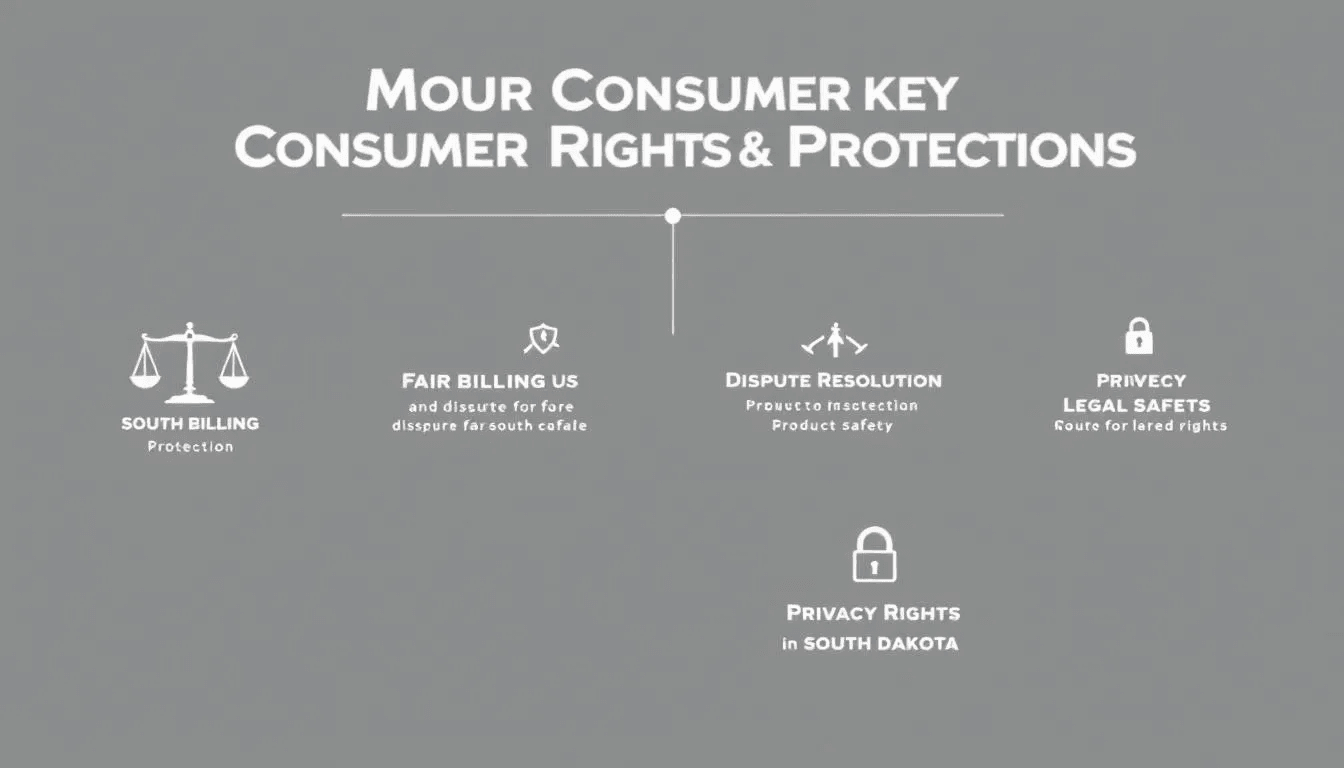

Utility services are an essential part of daily life, and consumers in South Dakota have specific rights regarding these services. The South Dakota Public Utilities Commission (PUC) assists consumers in resolving disputes with electric, natural gas, and telephone service providers.
Knowing your rights and where to seek help can significantly impact your ability to deal with utility issues.
Filing Utility Complaints
If informal resolution with a utility provider fails, consumers may need to file a formal complaint with the South Dakota Public Utilities Commission. This involves a documented case review by the commission, which investigates the issue and seeks a fair resolution.
Contact Information for Utility Commissions
Consumers can contact the South Dakota Public Utilities Commission for assistance via phone at (605) 773-3201 or (800) 332-1782, email at PUC@state.sd.us, or mail at 500 E. Capitol Ave., Pierre, SD 57501-5070.
The PUC is responsible for overseeing utility services in the state and ensuring fair practices.
Legal Action and Hiring an Attorney
Sometimes, resolving consumer protection issues requires legal action. Understanding when and how to seek legal counsel can be crucial for navigating the complexities of consumer protection laws.
Hiring an attorney significantly enhances the chances of a favorable outcome in these cases.
Filing a Lawsuit
In South Dakota, consumers can file a lawsuit against businesses that violate consumer protection laws. This process involves gathering evidence, identifying the defendant, and filing a complaint in the appropriate circuit court. Consumers must file their claims within four years of the violation to ensure their case is heard.
Legal action can be necessary for seeking compensation for damages or enforcing compliance with consumer protection laws. Timely and well-documented claims are essential for a successful lawsuit.
Benefits of Legal Representation
Having an experienced attorney can significantly improve the chances of a successful outcome in consumer protection cases. Attorneys provide expert legal guidance, represent clients in court, and navigate the complex procedures involved in these cases. This professional support ensures that consumers can effectively advocate for their rights and achieve fair resolutions.
Legal representation is especially crucial in cases involving significant damages or complex legal issues. By hiring a knowledgeable attorney on behalf of consumers, they can ensure their interests are well-protected and that they have the best chance of success.
Unique Consumer Protection Laws in South Dakota
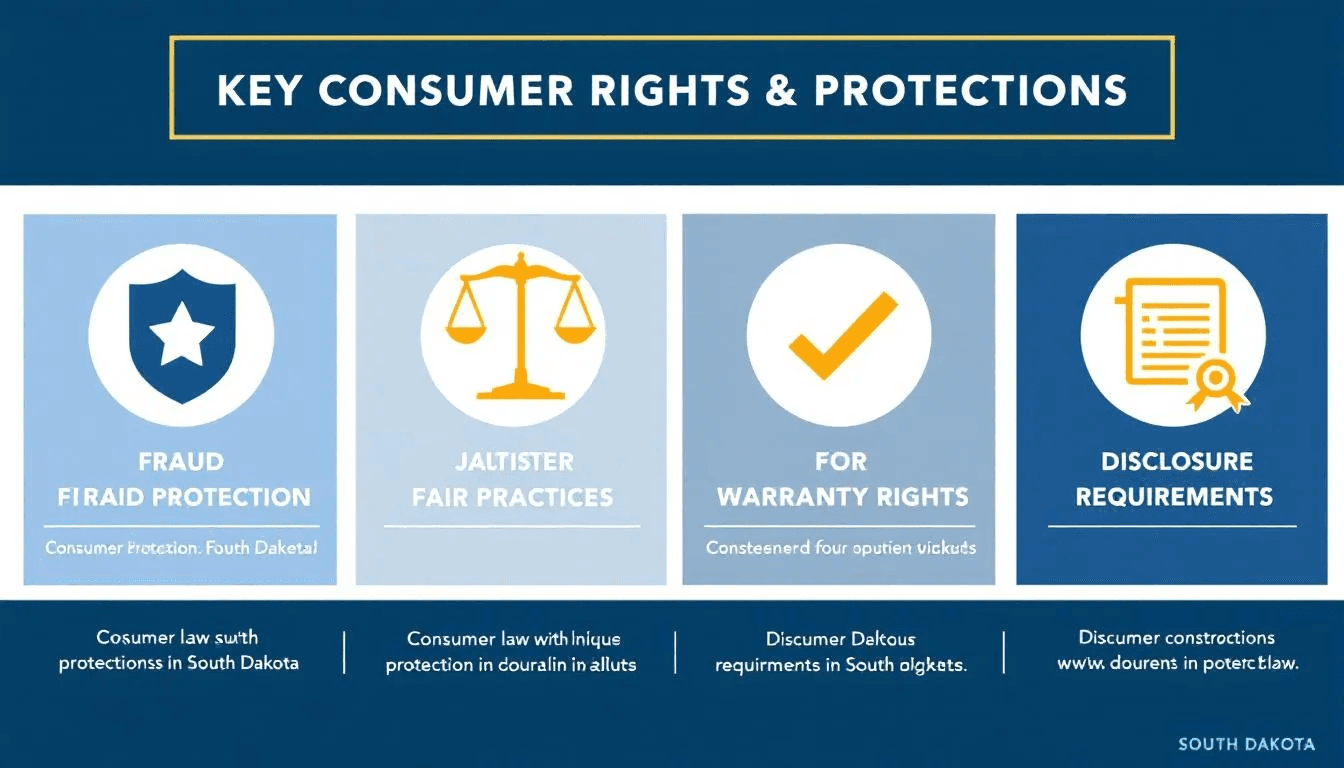

South Dakota has enacted unique consumer protection laws to better shield residents from scams and fraudulent activities. These laws are designed to prevent misleading business practices and ensure fair treatment for all consumers.
Understanding these laws can help consumers recognize their rights and take appropriate action when necessary.
South Dakota Lemon Law
The South Dakota Lemon Law provides specific protections for consumers who purchase new vehicles with significant defects. If a vehicle has a defect that affects its use, value, or safety and cannot be repaired after multiple attempts, the consumer is entitled to a refund or replacement. The defect must be reported within the first year or 12,000 miles to qualify.
Consumers must have made at least four repair attempts for the same issue, including one during the designated rights period. Information on how to file a Lemon Law claim can be accessed through the South Dakota Office of Attorney General.
Other Notable Laws
In addition to the Lemon Law, the South Dakota Consumer Protection Act provides a comprehensive framework to safeguard consumers from unfair practices. This act specifically targets deceptive trade practices and regulates door-to-door sales, giving consumers the right to cancel such transactions within a specified period. Understanding these protections helps consumers navigate the marketplace and avoid scams.
These laws are designed to ensure fair treatment and provide consumers with the tools they need to seek recourse against fraudulent activities. Staying informed about these protections can empower consumers to take proactive steps in defending their rights.
Resources and Contact Information
Access to resources and contact information is vital for consumers seeking assistance with their rights and complaints. The South Dakota Division of Consumer Protection offers a variety of educational materials and support services to help consumers understand their options and navigate the process of filing complaints.
Additionally, the South Dakota Division of Securities provides resources to help investors make informed decisions.
Division of Consumer Protection Contact Info
Consumers can contact the South Dakota Division of Consumer Protection through the following methods:
- Phone: (605) 773-4400
- Toll-free (in-state calls): 1-800-300-1986
- Email: consumerhelp@state.sd.us
- Mailing address: 1302 E Hwy 14, Suite 3, Pierre, SD 57501
The Division is dedicated to helping consumers with complaints and inquiries, providing a reliable resource for addressing consumer issues in this section.
Additional Resources
The South Dakota Attorney General’s website offers a wealth of consumer protection resources, including educational materials and hotlines for assistance. These resources are essential for consumers to understand their rights and take effective action when needed.
Utilizing these tools can empower consumers to protect themselves and address their concerns effectively.
Summary
In conclusion, South Dakota offers robust consumer protection laws and resources designed to ensure fair treatment and protect consumers from fraudulent activities. From understanding key laws and filing complaints to seeking legal action and accessing resources, consumers are well-equipped to defend their rights. By staying informed and utilizing the available resources, you can confidently navigate any consumer-related issue and safeguard your interests. Remember, your rights matter, and taking proactive steps can make all the difference.
Frequently Asked Questions
What does the consumer protection department do?
The consumer protection department safeguards individuals from unfair and deceptive practices, taking action against violators. It also investigates fraud and collaborates with law enforcement to address and eliminate harmful business practices.
How do I file a consumer complaint in South Dakota?
To file a consumer complaint in South Dakota, first attempt to resolve the issue directly with the business. If unsuccessful, you may submit your complaint to the South Dakota Division of Consumer Protection through phone, email, fax, or their online portal.
What documentation is required when filing a complaint?
When filing a complaint, it is essential to include receipts, contracts, advertisements, canceled checks, bills, and related correspondence. Maintaining detailed records of interactions with the business will also support your case effectively.
What are common banking issues that lead to consumer complaints?
Common banking issues that lead to consumer complaints include unauthorized fees, loan disputes, and discrepancies in banking statements. It is crucial for consumers to remain vigilant and address these concerns promptly with their financial institutions.
How does the South Dakota Lemon Law protect consumers?
The South Dakota Lemon Law protects consumers by ensuring that if a new vehicle has significant defects that cannot be repaired after multiple attempts, they are entitled to a refund or a replacement, provided the defect is reported within the first year or 12,000 miles. This law offers vital recourse for buyers of faulty vehicles.

